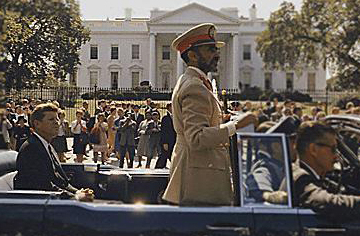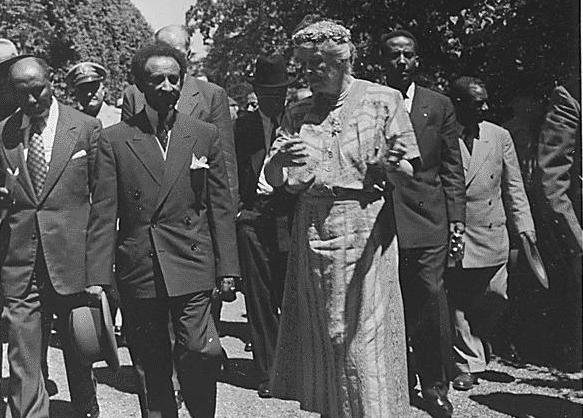
Tadias Editorial
Above photo: President Kennedy and Haile Selassie during
a parade honoring the Emperor. Washington, D.C.
(Date Photographed: October 1, 1963)
New York (Tadias) – 2008 marks the 105th year since the commencement of official diplomatic relations between the governments of the United States of America and Ethiopia. The forging of these relations was all the more historic in that viewing Africa as within the European sphere of influence, the US had virtually no relations with the continent at the time, and would not until well after World War II. With the exception of Liberia, founded in 1847 by freed American slaves, and white-ruled South Africa, no other black African country was on the U.S. diplomatic radar at the time. In this sense, then, Ethiopia really was the first black African country that the United States ever befriended.
For over a century now following the signing of a commercial treaty between President Theodore Roosevelt and Emperor Menelik II on December 27th, 1903, close relations between the two countries have endured nearly uninterrupted. During the long reign of Emperor Haile Selassie I in Ethiopia, the country accounted for about half of all the military and development assistance lent by the United States to Black Africa and often hosted the largest detachment of Peace Corps volunteers on the continent.

Eleanor Roosevelt and Haile Selassie at Hyde Park, New York, 05/30/1954
(National Archives and Records Administration)
Even during the seventeen-year reign of the now-deposed Mengistu Haile Mariam, Ethiopia was the beneficiary of the largest disbursement of food aid extended by the U.S. to Africa. Following the collapse of the Soviet Union in 1989, the United States brokered Ethiopia’s transition to the post-Cold War world order and has remained its closest and most influential western ally since.
While the geo-strategic significance of the Horn of Africa has always constituted an important consideration in the launching and maintenance of these relations, some of the country’s unique attributes, like its primeval Judaeo-Christian and Moslem roots and nearly all-encompassing socio-cultural heritages have also endeared the country to Americans inducing strong people to people bonds that go well beyond formal state to state relations. Today, Ethiopians in the U.S. make up one of the largest groups of African immigrants.
Equally important and of particular historical note are the past and continuing bonds between Ethiopia and the African American Community. Relations between the African-American diaspora and Ethiopia predate 1903. The nation’s triumph over Italian colonial aspirants at the battle of Adwa in the nineteenth century inspired black nationalist leaders and advocates of freedom throughout the continent and the new world. While some founding pan-Africanists and pioneering black scholars raised slogans like “back to Ethiopia”, and the only independent black country in the western hemisphere at the time, Haiti, established contact with the Empire early on, at every challenging turn during the nation’s troubled entry and ongoing transition to modernity in the 20th. and 21st centuries, African Americans have stood by them, whether it be to fight fascism or to combat famine and AIDS.
A series of articles to commemorate 105th anniversary of U.S. – Ethiopia relations will be published on Tadias Magazine between now and January 2009. The papers are primarily designed as a review and rerecording of the remarkable historical ties between the two countries and a dialogue to pin point areas where continuing cooperation can yield beneficial results. It will include reflections by former Ambassadors/Diplomats from both countries and discussions by several scholars from across the country. If you feel you can contribute an article to fit the editorial calendar, please contact us at info@tadias.com.


























What about Haiti. The United States established diplomatic relations and recognition of Haiti after the civil war.